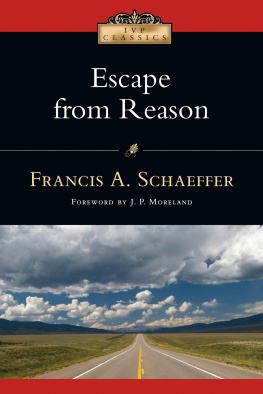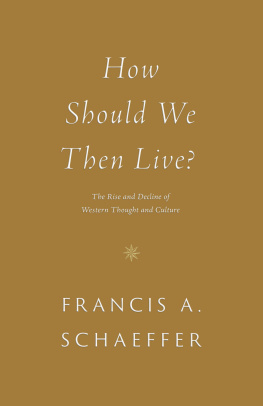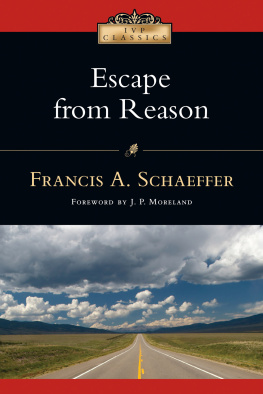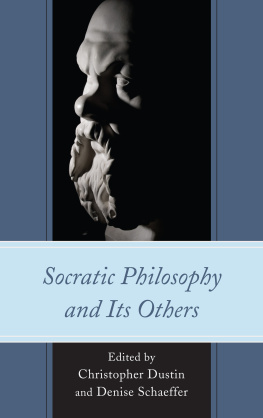Foreword
T he leaves were beginning to fall on the campus of the University of Vermont. It was the autumn of 1972. I had come to faith in Jesus Christ in 1968 through the ministry of Campus Crusade for Christ at the University of Missouri, and upon graduation in 1970, I joined Crusade staff and spent my first two years in Colorado. In the summer of 1972 I went to Vermont to open the Crusade work at the university.
I was an intellectually curious young man before my conversion and that continued to be important to my newfound faith. It was the 60s, the culture was in turmoil, movements multiplied faster than rabbits, and Timothy Leary was rumored to be dead. The winds of a multitude of ideologies swirled around college campuses, and all sorts of activists vied for student allegiance. It was critical to have intellectual leadership for the Jesus Movement, and the works of such luminaries as Josh McDowell, C. S. Lewis and F.F. Bruce helped to fill this void.
Earlier that autumn day at the University of Vermont, I had engaged in a lengthy debate with Marxist radicals at their book table in the square outside the student union. I was new at all this, and I realized my need for more ammunition, more reflection from a Christian worldview and more exposure to deep Christian thought. And I was painfully aware of the need for such material for the new converts who were popping up all over the country.
Suddenly, I came across a group of about ten students sitting on the lawn. From a distance it was apparent that they were having a deep, sometimes heated discussion. As I neared them, it became obvious that they were Christians. And they were all holding copies of the same book that was clearly the intellectual source of their conversation. What was the book? It was Francis Schaeffers Escape from Reason.
I immediately went to a Christian bookstore, bought and read the book, and became hooked on everything Schaeffer wrote. Schaeffers thought, and in particular this little mental time bomb Escape from Reason, formed the core of the reflection and marching orders for an entire generation of young Christian radicals. I was no exception. Along with Bruces The New Testament Documents: Are They Reliable? Lewiss Mere Christianity and Schaeffers other revolutionary manifesto The God Who Is There, Escape from Reason shaped, matured, informed, inflamed, inspired and empowered a movement whose impact is still being felt the world over.
To be sure, Escape from Reason has had its critics. Some claim it is too simplistic. After all, they argue, how can one cover Kant and Rousseau in three and a half pages? Others argue, sometimes correctly, that Schaeffer paints with too broad a brush and, as a result, somewhat misrepresents certain thinkers. I, for one, do not think his treatment of Thomas Aquinas is entirely fair or accurate. However, at the end of the day these criticisms miss the genius of this book. Escape from Reason brings together a staggering array of academic disciplines, cultural trends and influential thinkers, and provides an integrative, mature analysis and critique of their ideas from within an historic Christian worldview. No one else was even close to doing that in those days, and Schaeffer did it well. This is why, if currently asked, the overwhelming majority of Christian philosophers, theologians and thinkers in their thirties or older will say that Schaeffer was their intellectual father and that they were nurtured at his knee by Escape from Reason.
I am overcome with emotion at the rerelease of this classic. I am also filled with hope. Todays evangelical culture is in a struggle with the worldviews of naturalism and postmodernism, and Schaeffers discussion of the upper and lower stories is as relevant today as ever. Todays evangelicals also need to connect with their history, especially their recent past, and the long shadow of Francis Schaeffer covers much of that past. May the rerelease of Escape from Reason spark a revolutionary movement for this generation as it did for mine.
J. P. Moreland
Distinguished Professor of Philosophy
Talbot School of Theology, Biola University
Preface
I f a man goes overseas for any length of time we would expect him to learn the language of the country to which he is going. More than this is needed, however, if he is really to communicate with the people among whom he is living. He must learn another languagethat of the thought-forms of the people to whom he speaks. Only so will he have real communication with them and to them. So it is with the Christian church. Its responsibility is not only to hold to the basic, scriptural principles of the Christian faith, but to communicate these unchanging truths into the generation in which it is living.
Every generation of Christians has this problem of learning how to speak meaningfully to its own age. It cannot be solved without an understanding of the changing existential situation which it faces. If we are to communicate the Christian faith effectively, therefore, we must know and understand the thought-forms of our own generation. These will differ slightly from place to place, and more so from nation to nation. Nevertheless there are characteristics of an age such as ours which are the same wherever we happen to be. It is these that I am especially considering in this book. And the object of this is far from being merely to satisfy intellectual curiosity. As we go along it will become clear how far-reaching are the practical consequences of a proper understanding of these movements of thought.
Some may be surprised that in analyzing the trends in modern thought I should begin with Aquinas and work my way forward from there. But I am convinced that our study must be concerned at one and the same time with both history and philosophy. If we are to understand present-day trends in thought we must see how the situation has come about historically and also look in some detail at the development of philosophic thought-forms. Only when this has been done are we ready to go on to the practical aspects of how to communicate unchanging truth in a changing world.

















